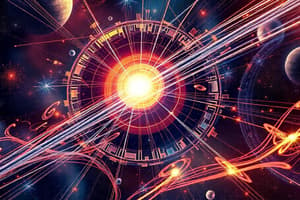Podcast
Questions and Answers
What does the equivalence of mass and energy, as described in relativity, state?
What does the equivalence of mass and energy, as described in relativity, state?
- Energy is dependent on gravitational force.
- Mass has no relevance in the context of light.
- Energy can neutralize the effects of mass.
- Mass can be converted entirely into energy under certain conditions. (correct)
Which phenomenon is not a consequence of special relativity?
Which phenomenon is not a consequence of special relativity?
- Time dilation
- Length contraction
- Wave-particle duality (correct)
- Constant speed of light
Which of the following principles is unique to quantum mechanics?
Which of the following principles is unique to quantum mechanics?
- Conservation of energy
- Newton's second law
- Wave functions (correct)
- The law of inertia
In classical mechanics, what does Newton's second law, F=ma, represent?
In classical mechanics, what does Newton's second law, F=ma, represent?
Which of the following is a key aspect of electromagnetism?
Which of the following is a key aspect of electromagnetism?
What does general relativity propose about gravity?
What does general relativity propose about gravity?
Which of the following applications is based on quantum mechanics?
Which of the following applications is based on quantum mechanics?
What does the uncertainty principle in quantum mechanics imply?
What does the uncertainty principle in quantum mechanics imply?
What concept explains the dual nature of light as both a wave and a particle?
What concept explains the dual nature of light as both a wave and a particle?
Which of the following statements is true regarding the Schrödinger equation?
Which of the following statements is true regarding the Schrödinger equation?
What phenomenon occurs when an object approaches the speed of light, resulting in effects such as time dilation and length contraction?
What phenomenon occurs when an object approaches the speed of light, resulting in effects such as time dilation and length contraction?
Which of the following aspects does general relativity fundamentally address?
Which of the following aspects does general relativity fundamentally address?
Which concept is associated with the quantization of energy in quantum mechanics?
Which concept is associated with the quantization of energy in quantum mechanics?
What characterizes simple harmonic motion (SHM)?
What characterizes simple harmonic motion (SHM)?
What principle states that energy in an isolated system remains constant?
What principle states that energy in an isolated system remains constant?
Which process occurs at constant pressure?
Which process occurs at constant pressure?
What is the effect of increasing temperature on the volume of an ideal gas at constant pressure?
What is the effect of increasing temperature on the volume of an ideal gas at constant pressure?
What does Gauss's law relate to?
What does Gauss's law relate to?
In the context of thermodynamics, which is true about entropy?
In the context of thermodynamics, which is true about entropy?
What is rotational kinetic energy determined by?
What is rotational kinetic energy determined by?
What is the principle behind Faraday's law of electromagnetic induction?
What is the principle behind Faraday's law of electromagnetic induction?
Flashcards
Classical Mechanics
Classical Mechanics
Describes the motion of everyday objects using Newton's laws.
Newton's Laws
Newton's Laws
Three laws governing motion: inertia, F=ma, and action-reaction.
Special Relativity
Special Relativity
Deals with objects moving at constant velocity, with constant speed of light.
General Relativity
General Relativity
Signup and view all the flashcards
Quantum Mechanics
Quantum Mechanics
Signup and view all the flashcards
Electromagnetism
Electromagnetism
Signup and view all the flashcards
E=mc²
E=mc²
Signup and view all the flashcards
Wave-Particle Duality
Wave-Particle Duality
Signup and view all the flashcards
AC Circuit Reactance
AC Circuit Reactance
Signup and view all the flashcards
Heisenberg Uncertainty Principle
Heisenberg Uncertainty Principle
Signup and view all the flashcards
Time Dilation
Time Dilation
Signup and view all the flashcards
Schrödinger Equation
Schrödinger Equation
Signup and view all the flashcards
Relativistic Momentum
Relativistic Momentum
Signup and view all the flashcards
Newton's 2nd Law
Newton's 2nd Law
Signup and view all the flashcards
Conservation of Energy
Conservation of Energy
Signup and view all the flashcards
Projectile Motion
Projectile Motion
Signup and view all the flashcards
Ideal Gas Law
Ideal Gas Law
Signup and view all the flashcards
Electric Potential Energy
Electric Potential Energy
Signup and view all the flashcards
Ohm's Law
Ohm's Law
Signup and view all the flashcards
First Law of Thermodynamics
First Law of Thermodynamics
Signup and view all the flashcards
Torque
Torque
Signup and view all the flashcards
Study Notes
Physics Overview
- Physics is the fundamental science that studies matter, energy, and their interactions. It encompasses a wide range of phenomena, from the smallest subatomic particles to the largest structures in the universe.
Classical Mechanics
- Classical mechanics describes the motion of objects in everyday life, using Newton's laws of motion and gravitation.
- Key concepts include: force, mass, acceleration, momentum, energy, work, and power.
- Newton's laws of motion: First law (inertia), second law (F=ma), third law (action-reaction).
- Applications include: projectile motion, circular motion, harmonic motion, and the dynamics of rigid bodies.
- Conservation laws, such as energy conservation and momentum conservation, are fundamental to classical mechanics.
Relativity
- Special relativity deals with the behavior of objects moving at constant velocities relative to a frame of reference.
- Key postulates include: the constant speed of light and the laws of physics are the same for all observers moving at constant velocity relative to each other.
- Consequences include: time dilation, length contraction, and the equivalence of mass and energy (E=mc²).
- General relativity extends special relativity to include gravity.
- It describes gravity not as a force, but as a curvature of spacetime caused by the presence of mass and energy.
- Key concepts include: spacetime, geodesics, black holes, and gravitational waves.
Quantum Mechanics
- Quantum mechanics describes the behavior of matter and energy at the atomic and subatomic level.
- It differs fundamentally from classical mechanics, introducing concepts like quantization of energy and wave-particle duality.
- Key concepts include: wave functions, operators, quantum states, superposition, entanglement, and uncertainty principle.
- Applications include: semiconductors, lasers, transistors, and other technologies based on quantum phenomena.
- Quantum field theory extends quantum mechanics to include particles and their interactions.
Electromagnetism
- Electromagnetism describes the interactions between electric and magnetic fields.
- Key concepts include: electric charge, electric field, magnetic field, electromagnetic forces.
- Maxwell's equations describe the fundamental laws of electromagnetism.
- Electromagnetic waves, such as light and radio waves, are described by electromagnetic theory.
- Applications include: electricity generation, telecommunications, and electronics.
Thermodynamics
- Thermodynamics describes the relationship between heat, work, and energy.
- Key concepts include: temperature, heat, internal energy, entropy, and the laws of thermodynamics.
- First law: conservation of energy.
- Second law: entropy always increases in a closed system.
- Third law: the entropy of a perfect crystal approaches zero as temperature approaches absolute zero.
- Applications include: heat engines, refrigerators, and the study of phase transitions.
Studying That Suits You
Use AI to generate personalized quizzes and flashcards to suit your learning preferences.




